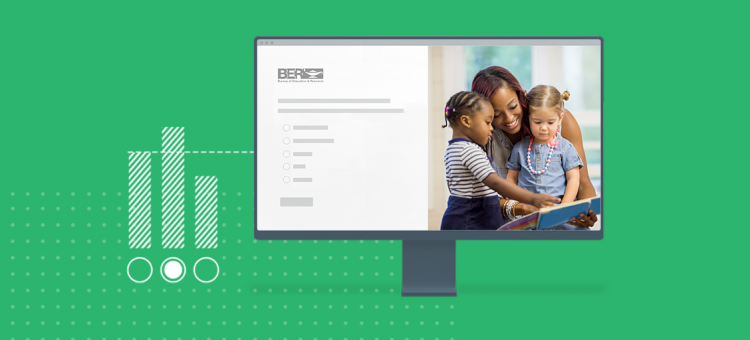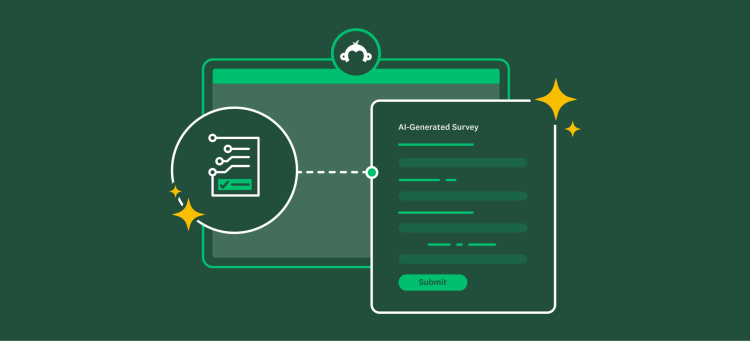Like the educators it helps every day, Bureau of Education and Research (BER) recognizes that it’s important to see challenges as opportunities to grow.
BER provides professional development and training resources for teachers across North America. Its seminars, conferences, and train-the-trainer programs are focused on sharing practical strategies and research that can be immediately implemented in classrooms. The company is committed to providing a best-in-class experience that empowers educators—which is why feedback is such an essential part of its day-to-day work.
Surveys are used to gauge the effectiveness of BER programs and include a scoring system that uncovers whether the event and instructor are resonating with attendees. Instructors are required to retain a 6.5 average score out of a 7-point scale. These scores, and attendees’ overall feedback, highlight what's working and when instructors could use additional support. With these insights, BER is able to confidently and consistently nurture teachers’ professional growth.
Teachable moment: a pandemic pivot
“When COVID-19 hit, we had a decision to make,” said Lena Vecherkina, Media Training Manager at BER. “Were we going to adapt? Yes. But how could we do that quickly, and what was the best solution for us?”
While BER wasn’t new to hosting online events, the majority of its programs before the coronavirus were held in person. It was clear that the company needed to shift to 100% virtual offerings in response to the pandemic. To do that effectively, it needed to consider whether its current processes and resources could support the “new normal.”
The biggest challenge was that BER’s survey system was based on pen and paper submissions and manual analysis. At in-person seminars, attendees received paper handbooks with a tear-out survey at the back. An on-site BER employee would average scores, figure out the percentage of attendees who’d completed the survey, and conduct any other calculations needed to support the data. These paper surveys were then mailed to BER offices, where the data was processed by several team members. On days when multiple seminars were being held, BER was dealing with thousands of paper surveys.
“For the most part, we were still operating how we were when BER was founded more than 40 years ago,” said Vecherkina. “We had decades of scoring data—cabinets and cabinets full of papers. And we were pretty reliant on the postal system.”
As the head of BER’s online learning department, Vecherkina knew that if the company’s programs were going virtual, its feedback system needed to keep up. She proposed using SurveyMonkey so BER could simplify its survey process, supercharge team collaboration, and continue to collect valuable feedback, even in the face of COVID-19.
Optimizing a feedback program for COVID-19 and beyond
Reimagining how BER did business was a team effort, and it was fueled by a SurveyMonkey Team Premier plan. But the benefits went beyond BER’s immediate challenges during the coronavirus pandemic. As Vecherkina and her team shifted BER from paper surveys to the power of SurveyMonkey, they quickly saw that it was a better way to collect feedback under any circumstance. The entire survey process—from creation to analysis—was easier, more collaborative, and built to support data-driven actions.
The survey results are almost instant. Company-wide, that’s made a big difference.
Vecherkina, along with the logistics department, executive assistants, and developers, embraced SurveyMonkey’s convenience and customization features. They added BER’s logo to survey footers, customized survey end pages to direct respondents to BER’s website, and used QR codes to instantly send attendees to post-event surveys. With SurveyMonkey streamlining the workload, the team could focus on the immediate and future needs of BER’s online programs.
Vecherkina was pleasantly surprised by how quickly everything came together—and how easy it was to collect and review data with SurveyMonkey. “I’ve never had the opportunity to just scroll through a seminar’s feedback like I can with SurveyMonkey,” she said. “Even if we have more than a dozen seminars scheduled in a day, I can quickly review and understand what’s happening. The survey results are almost instant. Company-wide, that’s made a big difference.”
Having easy access to that kind of data was especially helpful for BER developers, who sit in on seminars and provide post-event coaching to help instructors refine their techniques.
In those coaching sessions, developers refer to survey responses to clarify an instructor’s strengths and areas for improvement. Previously, it could take up to 3 weeks to collect, review, and mail BER’s paper surveys, which meant that feedback wasn’t always available when needed.
With SurveyMonkey, developers could simply log in and look at an instructor’s scores on the spot. And, since SurveyMonkey took care of averaging scores and collecting data, they could forget about number-crunching and focus on coaching instructors to be their most effective.
However, while it was important for developers to be able to access and analyze survey results, they didn’t need to be involved in the survey creation process. That’s when Vecherkina experienced the flexibility of BER’s team plan firsthand. As soon as she learned that Contributor seats were a lower-cost way for team members to dig into the data, she knew it was just what her team needed.
“Contributor seats ensured we had the right people on board, at the right price, to make the most of our survey insights” she said. It also allowed Vecherkina to offload some of the survey analysis to team members with Contributor seats. With that kind of freedom, Vecherkina and her team could tackle COVID-19 business challenges, and everyday work, with exactly the right support from SurveyMonkey.
Better feedback and a clear path forward
In addition to advancing BER’s feedback program, SurveyMonkey has made a big difference for the quality of feedback that instructors receive.
“With paper surveys, the people who tended to fill them out either loved the seminar or hated it,” said Vecherkina. “Now we’re capturing the responses from between those extremes. We’re getting more responses, and they’re a more accurate representation of our attendees and their experiences.”
When BER is able to return to in-person seminars, Vecherkina predicts that its feedback program will still rely on SurveyMonkey. “Now that we know we can do it, we’ll never stop offering virtual seminar options,” she said. “We’ll give attendees the choice about online or printed surveys—but we’ve seen what we can do with SurveyMonkey, and just how much flexibility and power we have.”
Ready to team up and accomplish more? Get more info on our team plans.
Already a team player? Find out how to get more people on board and add team seats.
What can you do with a SurveyMonkey team plan?
Get an overview of SurveyMonkey team plans and find out how to make your plan work for you. Empower your team and get insights faster!




